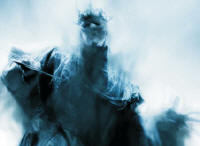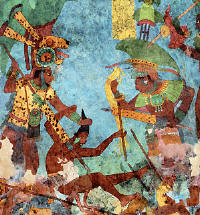Rethinking the Enemy
 One night, after we had put our son to bed, my wife and I watched the movie The Lord of the Rings: The Fellowship of the Ring (2001). I have always been a strong admirer of J. R. R. Tolkien, due to the universal messages of truth that can be found throughout his works, and as I watched the scene in the movie where the Lord of the Nazgul stabbed the young hobbit Frodo, I began to feel as if I needed to pay close attention. In the scene, Sam, Merry, Pippin, and Aragorn watch helplessly as Frodo slips further and further into unconsciousness and toward death.
One night, after we had put our son to bed, my wife and I watched the movie The Lord of the Rings: The Fellowship of the Ring (2001). I have always been a strong admirer of J. R. R. Tolkien, due to the universal messages of truth that can be found throughout his works, and as I watched the scene in the movie where the Lord of the Nazgul stabbed the young hobbit Frodo, I began to feel as if I needed to pay close attention. In the scene, Sam, Merry, Pippin, and Aragorn watch helplessly as Frodo slips further and further into unconsciousness and toward death.By the time the elf-princess Arwen arrives, Frodo has nearly become a wraith himself. In a beautiful, yet terrifying scene, she races against time, carrying him on her noble white horse toward Rivendell, the home of Elrond, the elf-lord and the only one with the skill to heal a wound caused by a Morgul blade. Charging through the woods and across the fields, clinging desperately to the hope of Frodo’s healing, Arwen is pursued by the Nazgul, the screeching Ringwraiths, who are determined to see the hobbit descend into their world. The music reaches a fevered pitch as the shadowy wraiths grasp and claw at the wounded Frodo and the Ring he carries. But Arwen deftly guides her brave horse through the woods and plains and on to the river that shields Rivendell from all evil.
Once she at last crosses the great river, Arwen turns toward the Nazgul. The wraiths pause at the water’s edge, sensing that this place is a domain of good. The elf-princess then does something that few of us would have the nerve to consider. She actually challenges the dark hosts! With a voice like fire and with her sword drawn, she defies the pursuing darkness, saying, “If you want him, come and claim him!” Not used to being resisted, the Nazgul are momentarily taken aback. Finally, with their cold, cruel swords flashing and hearts full of malice, desperate to snatch Frodo and the Ring, they begin to cross the river. At that moment, Arwen utters ancient words in the elvish tongue, which causes the waters of the river to rise to a raging torrent, and the Ringwraiths are washed away in the mighty flow!
What a scene! If only there were opportunities in real life to take a stand against such evil and play the hero in some great adventure. Replaying this scene again and again in my mind, I began to draw some important connections. What if the circumstances that unfolded in the lives of young people today are every bit as heroic and mythic as the events played out in the Fellowship of the Ring?
Think about it. Why do stories touch our hearts like nothing else can? One reason is that life comes at us scene by scene, just like a story! We remember our lives in an almost chapter by chapter way, don’t we? There was the fourth-grade chapter, the middle school chapter, the high school chapter, the college chapter, the first job chapter, . . . Yes, there is something about our lives that is very storylike!
I have been a middle school teacher for many years now. In that time, I have formed relationships with many students and had the opportunity to watch them grow and learn. I could tell stories that would leave you in stitches from laughing so hard! Other stories would bring tears. If we are honest with ourselves, we will admit that
 some of the trials that befell us during those school years would be things that we wish we could forget. Let’s face it, growing up is hard! We have all seen our share of heartache, harassment, the loss friendship, isolation, divorce, death, humiliation, and pressure—if not in our own story, then at least in the stories of our friends and loved ones. Some try to shrug it off, saying that this is all just a part of adolescence, and that the kids will “get over it.” But many of you have witnessed these ordeals firsthand . . . and many have never gotten over it. The wounds they have endured in those years of life have stayed with them, like a cancer on the soul. One man I was mentoring finally confessed to me after several months that the tormenting he endured in eighth grade at the hands of a few bullies has played a huge part in his current struggle with anger issues.
some of the trials that befell us during those school years would be things that we wish we could forget. Let’s face it, growing up is hard! We have all seen our share of heartache, harassment, the loss friendship, isolation, divorce, death, humiliation, and pressure—if not in our own story, then at least in the stories of our friends and loved ones. Some try to shrug it off, saying that this is all just a part of adolescence, and that the kids will “get over it.” But many of you have witnessed these ordeals firsthand . . . and many have never gotten over it. The wounds they have endured in those years of life have stayed with them, like a cancer on the soul. One man I was mentoring finally confessed to me after several months that the tormenting he endured in eighth grade at the hands of a few bullies has played a huge part in his current struggle with anger issues.As the diabolical Spider-Man (2002) movie villain the Green Goblin plotted the demise of the web-slinging hero, he cackled, “The cunning warrior attacks neither the body nor the mind. Attack the heart!” Look at your own life. Your heart has been wounded. Things that you did, or that were done to you, have shaped the person you are today.
Labels: Arwen, death, divorce, Green Goblin, humiliation, isolation, mentor, Spider-Man, Tolkien, Witch King



0 Comments:
Post a Comment
<< Home